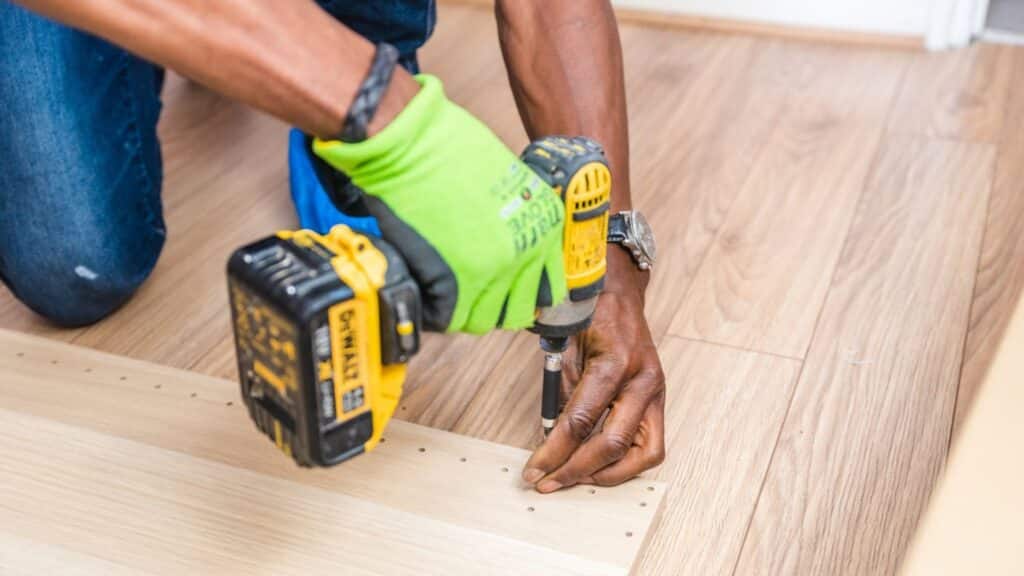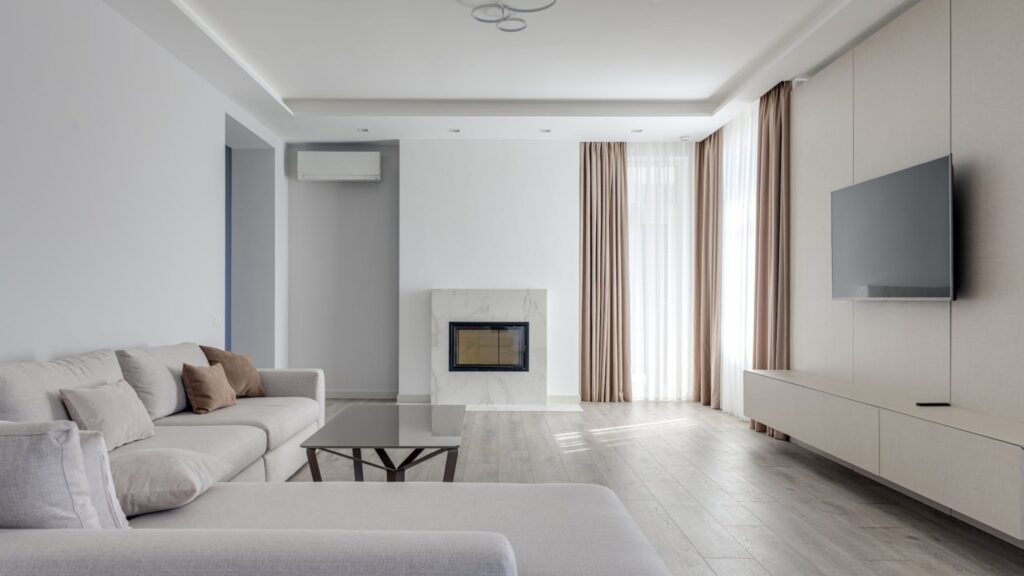Last Updated on June 4, 2023 by Pro Handyman Editorial Team
Understanding the benefits and limitations of various TV setup options can significantly enhance your viewing experience. This article aims to provide comprehensive insight into these options, primarily focusing on the stand mount and wall mount methods.
Stand Mount: An Overview
Stand mounting is popular among television owners, primarily due to its simplicity and versatility. This method involves positioning your television on a flat surface, typically a moderate-height table or dedicated stand.
Stand Mount: The Pros
The convenience and rapidity of a stand mount setup make it an appealing choice. With most modern televisions, whether LED, OLED, or Plasma, coming with a base stand, you can easily set up your TV on a stand at home with essential tools.
The stability of the stand mount allows you to easily manage the distance from the wall and manage cables and other equipment. Access to the back of the TV is straightforward, making cable management and port access simpler. Moreover, stand mounts often come with additional storage space, allowing you to conveniently store other devices such as Blu-Ray players, gaming consoles, or soundbars.
Mobility is another key advantage of stand mounts. You can quickly move your TV when needed, whether for cleaning, repositioning, or relocating.

Stand Mount: The Cons
Despite the numerous advantages, stand mounts do come with a few drawbacks. The primary concern is that they occupy surface space. Therefore, the TV stand must be broad enough to accommodate the base stand of the TV, which can often be quite broad.
Safety is another concern, especially for households with children and pets. As the TV merely rests on a surface, an accidental push can tip over the TV, causing potential damage or injuries.
Wall Mount: An Overview
As the name suggests, wall mounting involves attaching your television directly to a wall. Although this method may require more effort and resources than stand mounting, it offers unique advantages.
Wall Mount: The Pros
Wall mounting your TV can save space, making it an excellent choice for smaller rooms or houses. Apart from saving space, it also gives your room a minimalist aesthetic appeal. Furthermore, it allows for flexibility in TV placement.
Size limitations of stand mounts are nullified with wall mounts. As long as the wall is large enough, you can mount a TV of any size without worrying about fitting it on a table or stand.
Wall Mount: The Cons
Despite the appealing features, wall mounts do have some disadvantages. The installation often requires professional help, adding to the overall cost and effort. However, the mount could stay intact if installed securely and avoid damage.
Access to ports at the back of the TV can be challenging with wall mounts, and cables such as power and HDMI may be visible unless concealed in the wall. Lastly, additional equipment would still require a nearby table, stand, or cabinet.
Different Types of Wall Mounts
Multiple types of wall mounts are available in the market, each with unique benefits. Here are some options:
- Flat mount: A simple and basic wall mount type, the balanced support allows the TV to remain close to the wall. Although they offer no flexibility or change in viewing angle, they are secure, affordable, and easy to install.
- Tilt/swivel mount: Similar to the flat support but with additional flexibility. It allows you to adjust the viewing angle, making it suitable for rooms with different viewing positions.
- Full-motion mount: The most sophisticated wall mount offers the greatest flexibility and ease of use. It allows the TV to be angled according to the viewer’s position, making it suitable for large rooms with multiple seating options.

The Ultimate Guide to Wall-Mounting
Welcome to our comprehensive guide on how to wall-mount your television. Wall mounting a TV provides many advantages, and in this detailed guide, we will take you through every step of the process.
Why Choose Wall Mounting Over a Stand?
Opting for wall mounting can elevate your home aesthetic and create more usable space. As TVs increase in size, wall mounting becomes an increasingly popular choice. It allows you to display your television like a piece of art on the wall, freeing up surface area and offering you complete control over your TV’s positioning.
The Advantages of Wall Mounting
Space-Saving
Wall mountingfrees up valuable floor and surface space. This space-saving feature is especially beneficial for smaller homes or rooms.
Improved Aesthetics
When done correctly, a wall-mounted TV can improve the overall aesthetics of your living space. It can offer a sleek, minimalistic look and contribute to a clutter-free living area.
Customizable Viewing Height
Wall mounting provides the flexibility to position your TV at your preferred height. In addition, it allows you to optimize the viewing experience according to your seating arrangement.
A Detailed Guide on Wall Mounting
Here, we provide a comprehensive, step-by-step guide to wall mount your TV successfully.
Determine the Placement
Consideration of viewing angles is vital for optimal picture quality. Once mounted, repositioning the TV will require additional work and might leave unnecessary holes in your wall.

Locate the Wall Studs
Use a stud finder to identify the wall studs. Mark the locations with painter’s tape for easy reference.
Drill the Pilot Holes
Mark and drill small pilot holes for the mounting screws. Use a level to ensure straight mount placement, and make light pencil markings where you will drill holes.
Install the Mounting Bracket
Position the mounting bracket against the wall and drill the mounting screws into the pilot holes.
Attach the TV to the Mounting Plate
Identify the TV’s mounting plate attachment holes, remove any plastic coverings or pre-existing screws, and secure the mounting plate to the TV’s back using the provided hardware.
Wall Mount Your TV
Align the TV’s mounting arm with the wall bracket, and secure them together per the manufacturer’s instructions. Again, enlist the help of a partner for this potentially challenging task.

Enjoy Your Newly Mounted Television
Relish in the space-saving, aesthetically pleasing result of your efforts.
Conclusion
Wall mounting services have their unique advantages and disadvantages. Their choice depends mainly on your preferences, room space, and viewing needs.Whether you choose a stand mount or a wall mount, each has the potential to transform your experience.
